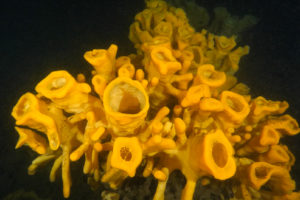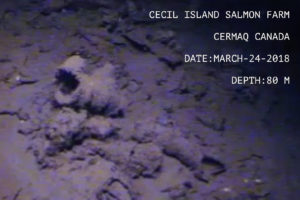26 April, 2018 (Vancouver, BC) – Two new glass sponge reefs have been discovered on BC’s coast, it was announced today. Underwater surveyors Farlyn Campbell and Jody Eriksson uncovered the incredibly rare, ancient glass sponge reefs near Port Hardy when surveying near fish farms.
Footage of these reefs collected by Tavish Campbell, Wild First campaign spokesperson, show that while one of these rare ecosystems is flourishing, the other, located directly below an open net-pen salmon farm, has been smothered by waste and is entirely dead.

Photo of newly discovered reef by Tavish Campbell Photography.

Photo of newly discovered reef destroyed by waste from a salmon farm. Photo by Tavish Campbell Photography.
The Canadian Parks and Wilderness Society (CPAWS) has been working to protect glass sponge reefs in BC for decades and calls this discovery a wakeup call.
“The discovery of these glass sponge reefs is both incredibly exciting and saddening,” said Ross Jameson, CPAWS-BC’s Ocean Conservation Coordinator. “To find a new, living reef is significant on a global scale. However, seeing the complete destruction of one of these reefs is devastating.”
Glass sponge reefs were thought to have gone extinct 40 million years ago, until living glass sponge reefs were discovered in Hecate Strait, BC in 1987. Glass sponge reefs are found only in BC and Alaska, making them globally unique to this coast. The reefs provide important habitat for a wide variety of marine species, including spot prawns, rockfish, and sharks, but are fragile and susceptible to damage.
“Glass sponge reefs are marine oases for many marine species on an otherwise barren, seafloor desert,” adds Jameson. “Failing to protect reefs jeopardizes the health of our entire coastal ecosystem. This discovery demonstrates the need to permanently protect the remaining glass sponge reefs throughout the province. It’s a wakeup call.”
Despite the importance of glass sponge reefs to BC’s ocean health, most glass sponge reefs lack any permanent, legislated protection. The two newly discovered glass sponge reefs, located in a remote area in the Broughton Archipelago, join other glass sponge reefs in BC missing effective protection.
“The footage of the two glass sponge reefs clearly show the effect the salmon farm has had on the reef below it,” said Tavish Campbell. “Where one reef is vibrant and full of life, the other is smothered in sediment and waste and appears dead.”
After more than two decades of campaigning by CPAWS, the glass sponge reefs of Hecate Strait and Queen Charlotte Sound were designated as a marine protected area (MPA) in early 2017. This MPA places restrictions on harmful activities protecting the reefs from direct damage by fishing gear and smothering due to sedimentation. Several other glass sponge reefs of varying sizes have been discovered in BC but have not received protection.
Given the fragile nature of these reefs and the current human activities in the area, Jameson believes that it is lucky that even one of these reefs is still alive. “With such limited restrictions on harmful activities along the coast, the discovery could just have easily been of two destroyed reefs,” notes Jameson.
To find out more about BC’s glass sponge reefs, the threats they face, and the work CPAWS is doing to protect them, visit www.glassspongereefs.com.
-30-
For more information contact:
Ross Jameson, Ocean Conservation Coordinator
ross@cpawsbc.org | (604) 685-7445 ext. 29
